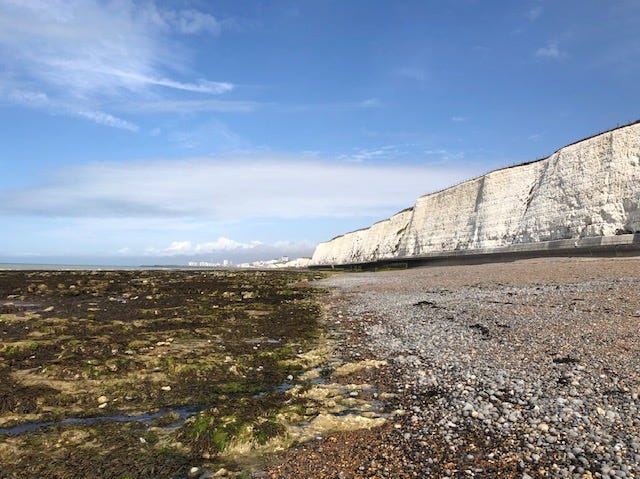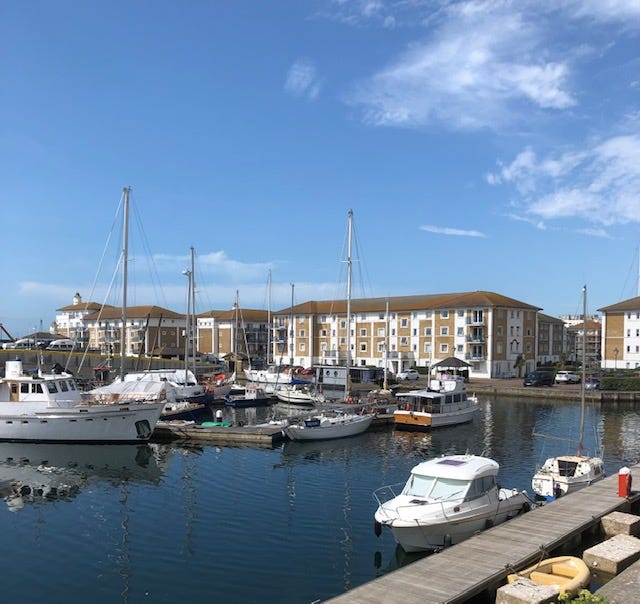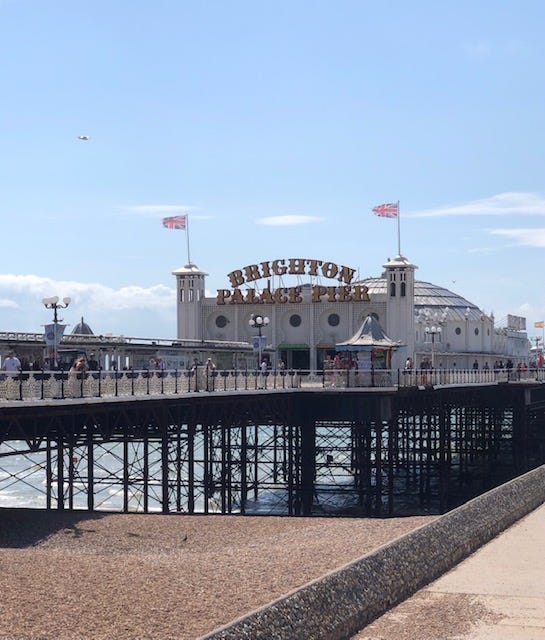Dear Reader,
My husband had a couple of location shoots to accomplish locally and had asked me to join him. ‘I don’t actually need you. But would you like a walk? I’ll drop you off at my first job in Rottingdean, then meet you in Hove after I’ve finished. Just keep the sea on your left.’

I packed my rucksack with a full 3-litre bladder of water, glucose tablets, sunblock, rehydration salts, snacks and a flask of tea. At the last minute I chucked in a book that I’ve been sort-of reading, sort-of not, on the off-chance that I might arrive in Hove ages before the shoot had finished and have the opportunity to try harder to get into it.
Yesterday had seen a temperature in the shade of 41 degrees C – a British record. Today was set to be cooler, plus I’d be on the coast with an onshore breeze, so I didn’t feel I’d be putting my life in danger. For the previous two days I hadn’t left the house, nor had any windows or curtains open, as it was so much hotter outside than in. It’s not typical for homes here to have air-conditioning, and as British weather is generally more meh than wow we simply rely on electric fans and drinking plenty of water if we’re having a rare hot spell.
Today was warming up pretty quickly, and I was glad of the sea breeze. I knew this would disguise how harmful the sun would be, so for the sake of my shoulders I was wearing a t-shirt rather than a sleeveless top, plus a bandana for my neck and my running cap with its big peak.
Rottingdean is a pretty village to the east of Brighton1, filled with flint-faced cottages and with plenty of history. A sign I walked past told me that Rudyard Kipling had lived in Rottingdean for around five years, during which time he’d worked on the ‘Just So Stories’.
Leaving the village pavements and their literary history behind, I found myself on the wide, smooth undercliff walk beside the shingle beach. Although it was a weekday morning before the schools were due to break up it was nevertheless busy, with athletic cyclists wearing all the gear sharing the path with an assortment of dog walkers. A pair of lithe bodies passed me at speed without breaking a sweat, and I felt clunky and inelegant in comparison with my big boots and even bigger rucksack, its water pipe swinging from one of its straps and the top of my flask poking precariously out of the side pocket.
I remembered what my mum had always told me.
‘Nobody’s looking at you, darling.’ It made me laugh.
I was helloed by a pair of runners, now walking, the one in black leggings grumbling good-naturedly to her friend in tiny pink shorts about how warm it was.
Because I was heading from east to west along a south-coast path, the sea was indeed on my left. The tide was out, revealing a large expanse of wave-cut platform perfect for rock-pooling. This beach would be packed by the weekend, the third week of July marking the end of the school year.

Beside the path a sign told me that Rottingdean had already given way to Ovingdean. It was hot, and the chalk cliffs were reflecting every scrap of sunlight straight back at me. I wondered how the sea lavender spilling down their almost vertical faces was managing to cling on.
Closer to Brighton, I heard shrill voices on the beach. Kitted out with plastic and bamboo fishing nets, and sporting their school’s regulation hi-vis vests, a couple of dozen excited children were clearly enjoying their end-of-term treat.
Today’s walk was my treat. I’d had a tough day yesterday, but here, out in the fresh air, was my chance for a re-boot.
With too much water on board already, I nipped into the public conveniences just off the path. They weren’t bad, considering, and although I was dismayed at how dark it was in there, there was at least some loo roll. I glanced up at the closed door of the cubicle I’d claimed.
‘You are enough.’
Reader, I am enough!
I felt better already.
Outside again, still heading west, the view wasn’t changing much: calm, flat sea on my left and the sheer cliff to my right. I occupied myself by counting – I do this a lot, actually. At home I count books on shelves, or the number of times I hear the phone ring. Even though I know that our staircase has twelve steps I’ll always count them all as I go up or down, left foot first for up, same foot first for down. And outside on walks I often catch myself muttering as I count my steps.
ONE-two-three-four-FIVE-six-seven-eight
ONE-two-three-four-FIVE-six-seven-eight
ONE-two-three-four-FIVE-six-seven-eight
My path was constructed from poured smooth concrete slabs. Starting with my left foot, I found that each slab took me six paces to cover, but after just a couple of slabs my right foot landed on the lumpy joint with the next one. Next slab: right foot first! This felt most unsatisfactory. It took another slab to get to a respectable left-foot start again. Reader, these things bother me. After a few more step/slab sequences I’d established that it was taking precisely four slabs to get me back to left foot first, and with that I found my need to count had passed.
I reached Brighton Marina on the very east of the city. Luxury contemporary flats, some with elaborate balconies of curlicued steel, were arranged with what I can only describe as canals in between, with moorings for assorted boats: everything from elegant wooden-hulled yachts to tatty day sailers, houseboats and ribs.
A family of adults whizzed towards me on bikes, the father and son sharing a tandem, the mother and daughter behind them each in command of their own vehicle. ‘I don’t like these bumps!’ the daughter called out.
No, I hadn’t liked landing on those concrete joints either.
As I passed the retail park towards the western end of the marina I could hear the loud industrial fans of the food outlets, which were belching the ubiquitious Brighton fumes of chips and vinegar. By now it was sweltering, and the smell of all that was making me feel queasy. I sped up, hoping for fresher air.
After the underpass I could see the city in front of me. My path was now bordered by a building site on the sea side, and on the right, now that I’d passed the cliffs, by a long lay-by which seemed to be an informal campsite for a raggletaggle collection of caravans and campervans. I thought they must belong to the contractors working at the site, but no, some residents were clearly full-timers. I walked past a surprisingly clean black VW hatchback tucked in between its campervan cousins, its roof’s real estate housing half a dozen pot plants2. Leaning against the car was a bearded blond man wearing only shorts, strumming a guitar and singing softly. He shot me a grin.
I stepped onto a smart new boardwalk running along the top of the beach, and stopped to rest on the first bench I came to. On the adjacent bench was a rather nice plate, the sort you might present a birthday cake on. Apart from a few crumbs it was empty. A man who’d been following me for a while – we’d overtaken each other a couple of times already at the marina – walked past both benches, then returned unexpectedly. He snatched up the plate and walked towards the city with it tucked under his arm, crumbs and all.
I passed him again about twenty minutes later, sitting on the promenade rolling a cigarette. No plate.
And here was the busiest part of the seafront, with its crazy golf, beach volleyball courts, fairground rides, deckchairs and ice cream kiosks. A small boy wailed: ‘My banana!’ His mum turned round. ‘It’s okay, it was just the last little bit.’
‘But I really wanted to eat that bit!’ He stuck out his lip.
The dropped remains of his banana lay on the prom less than a yard from one of the many bins. I did the necessary. A woman with a dog turned around from another bin, pulling a disgusted face.
‘Do you want some sanitiser?’ I sprayed her hands liberally from the spray bottle in my pocket.
‘All I did was pick up some rubbish from the beach, and look at the state of me!’ she complained.
We had a brief and very satisfying whinge about the state of the world today, and went our separate ways. I hoped she’d have some sanitiser with her next time she was disposing of other people’s rubbish.
Between the Palace Pier and the ruins of the West Pier were hordes of summer language school students, their different groups identifiable by their coloured caps and backpacks and the signs held up by their respective group leaders. Reader, it was bedlam. Tourists and students mingled in a tangled mess clutching ice creams, cardboard plates of fish and chips and paper bags full of those nasty ring doughnuts you can watch being made on the pier, the stretchy dough being extruded through metal dies into shimmering sunflower oil.
This was my first experience of being in a crowd since the start of the pandemic. It was awful.
Stepping onto the beach for some respite I was surprised to see a young woman standing on the shingle wearing a mortar board and graduation robe. I glanced up to street level to see hundreds more people looking just like her, all beaming widely as proud supporters snapped them for posterity with the pier in the background. Behind them, the modern façade of the Brighton Centre was festooned with banners proclaiming: UNIVERSITY OF SUSSEX GRADUATION 2022.
Well done them!
The dense crowds began at last to diffuse once I reached Hove Lawns with its strip of pretty beach huts, and with relief I became aware of a much stronger breeze. A tanned lady who had been occupied with a succession of impressive yoga poses paused briefly to put a fleece on.

Just over two and a half hours after we’d parted I reached the meeting point I’d arranged with my husband. It was a lovely spot: a quiet bench from where I could watch the white horses dance across the surface of the sea and a kite surfer in his absolute element soaring high above the waves. The book I’d brought with me stayed in my rucksack.
I’d kept the sea on my left.
I hadn’t got lost.
Reader, I’d made it.
Love,
Rebecca
If you enjoyed this post, please let me know by clicking the heart. Thank you!
Do you ever count your steps? I hope I’m sure I’m not the only one!
Thank you for reading! If you enjoy ‘Dear Reader, I’m lost’, please share and subscribe for free.
Until they were unified in 1997, Brighton and Hove were individual towns. Brighton & Hove was granted city status in 2001.
Not just plants in pots, but pot plants in pots. On the roof of a car.









Oh yes! When I run I count! I get to one hundred and start again and works well when I need a distraction. Thank you for sharing those lovely pictures.
The message in the loo was uplifting. The graffiti in men's loos tend to be less so.